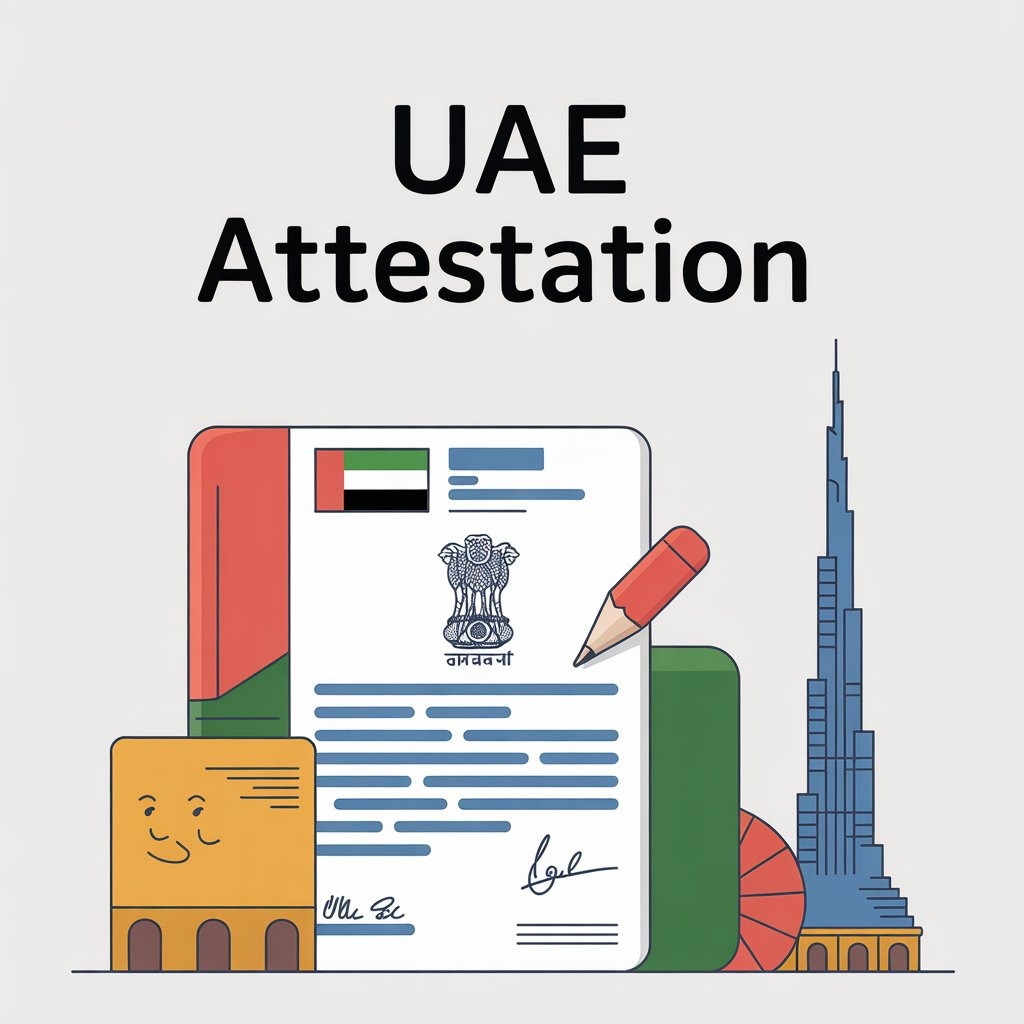UAE Embassy Attestation Guide 2025: Requirements
Discover the complete process and requirements for UAE embassy attestation in 2025. This guide covers everything you need to know about embassy attestation requirements for a smooth experience.
11/22/20257 min read


Introduction to UAE Embassy Attestation
UAE embassy attestation is a critical process for individuals seeking to live, work, or study in the United Arab Emirates. This process involves the official verification of documents, ensuring that they carry legal value within the jurisdiction of the UAE. The significance of UAE embassy attestation is amplified in a globalized world, where the exchange of documents across borders is frequent, and the need for authentication is paramount.
When an individual intends to relocate to the UAE for various purposes, be it employment, education, or family reunification, the submission of authentic documents is essential. UAE embassy attestation serves as a validation mechanism that provides assurance to employers, educational institutions, and governmental agencies that the presented documents are legitimate and accurately reflect the individual's identity and qualifications.
The process of embassy attestation involves several steps, starting from the notarization of documents by legal authorities in the home country, followed by verification by the Ministry of Foreign Affairs and subsequent validation by the UAE embassy. This chain of authentication establishes a thorough vetting process, which is essential for safeguarding against fraud and ensuring compliance with UAE regulations.
Moreover, documents that are commonly subject to UAE embassy attestation include educational certificates, marriage certificates, birth certificates, and various professional credentials. Each type of document may have specific requirements, and understanding these nuances is crucial for a smooth attestation process. UAE embassy attestation not only enhances the legitimacy of documents but also acts as a bridge to achieving one’s personal and professional aspirations in the UAE.
Types of Documents Requiring Attestation
Attestation is a crucial process for various documents, especially for individuals aiming to work, study, or establish residency in the United Arab Emirates (UAE). Notably, several types of documents typically require attestation by the UAE embassy to be deemed valid and recognized within the country. Understanding these document types can help streamline the overall attestation process.
Firstly, educational certificates are among the most frequently attested documents. This category includes degrees, diplomas, and transcripts issued by educational institutions. The UAE embassies often necessitate that educational qualifications be verified not only for authenticity but also to ensure that the certificates comply with local standards and regulations. Individuals should gather all necessary supporting documents, such as original certificates and an official transcript from the university, for a smooth attestation process.
Secondly, marriage certificates also require attestation in the UAE. Couples who are planning to reside or work in the UAE need to have their marriage certificate attested to ensure its legitimacy. The embassy may request the original certificate along with translations, especially if the document is not in Arabic or English. This process confirms the marriage's legal standing in the context of UAE laws.
Birth certificates constitute another essential document for attestation. Parents applying for visas for their children or those looking to register their children in schools within the UAE must have their child's birth certificate attested. Similar to the other document types, the original birth certificate may need to be submitted alongside a certified translation if necessary.
Lastly, commercial documents, including contracts, invoices, and business registrations, typically require attestation as well. This is especially true for companies looking to establish a presence in the UAE or engage in trade. These documents need to adhere to UAE commercial laws and may require notarization before embassy attestation.
Step-by-Step Process of Attestation
Obtaining embassy attestation in the United Arab Emirates (UAE) is a crucial process for those looking to validate their documents for various purposes, such as employment, education, or immigration. The process involves several key steps aimed at ensuring that your documents are legitimate and recognized by UAE authorities.
The first step in the attestation process is to obtain initial verification from the relevant authorities in your home country. This may include notarizing documents or obtaining certificates from local government offices or educational institutions. It is essential to verify which documents require attestation based on the specific requirements outlined by the UAE embassy as well as the intended use of the documents.
Once initial verification is secured, the next step is to approach the UAE embassy or consulate. Each embassy may have its own specific procedures and fee structures, so it is advisable to check the official website for detailed information. Typically, you will need to submit the necessary documents along with a completed application form and the required fees, which can vary depending on the type of document being attested.
Timelines for processing the attestation can vary greatly depending on the country and the specific embassy, ranging from a few days to several weeks. It is prudent to plan ahead and allow adequate time for this process, especially if documents are required for urgent situations.
Upon successful attestation, you will receive your documents back, now possessing official validation by the UAE embassy. It is advisable to check the attested documents for accuracy before using them for their intended purpose, ensuring that all details are correct and up-to-date.
Requirements for Attestation in 2025
As of 2025, the requirements for document attestation by the UAE embassy have undergone a series of updates and changes to align with evolving policies. It is crucial for individuals seeking attestation services to understand these requirements thoroughly, as the lack of proper documentation may lead to delays or rejections in the process.
To initiate the attestation process, applicants must present several key documents. The primary requirement is the original document that needs to be attested, accompanied by a clear photocopy. Common documents for attestation include educational certificates, marriage certificates, and other legal documents. Additionally, applicants must provide a valid form of identification, such as a passport or Emirates ID, to verify their identity.
One significant update in 2025 is the necessity for a verification letter from the relevant authority in the home country of the applicant. For instance, if the document originates from an educational institution, a verification letter confirming the authenticity of the certificate must be obtained beforehand. This further substantiates the legitimacy of the documents being submitted and streamlines the attestation process.
Furthermore, applicants should be aware of the period of validity for their documents, as certain documents may require renewal before attestation. Depending on the type of document, there may be additional specific requirements that could involve notarization or approvals from other local authorities.
In light of possible changes in visa regulations, it is advisable for applicants to remain updated about the policies concerning UAE embassies. Gathering the correct documentation and being knowledgeable about the current requirements for attestation will facilitate smoother processing and successful outcomes.
Common Challenges & How to Overcome Them
The UAE embassy attestation process can be complex and may present several challenges for individuals seeking to validate their documents. One common issue faced by applicants is document discrepancies. This occurs when there are inconsistencies between the documents submitted and the records held by relevant authorities. To mitigate this, it is crucial to thoroughly review all documents prior to submission. Ensure that names, dates, and other critical information are consistent across all paperwork and official records. Any discrepancies should be addressed immediately, as they can delay the attestation process significantly.
Lengthy processing times are another frequent challenge. The duration for document attestation can vary significantly based on the type of document, the country of origin, and the specific embassy's workload. To help offset potential delays, applicants are encouraged to submit their documents well in advance of any deadlines. Additionally, checking the embassy's official website for estimated processing times, and staying updated on any operational changes can aid in setting realistic expectations.
Miscommunications with authorities can also complicate the attestation process. Many applicants report confusion due to unclear requirements or insufficient information regarding their specific situation. To overcome this challenge, establishing direct communication with the embassy is essential. Utilizing official channels, such as emailing or calling the relevant sections of the embassy, can provide clarity. Furthermore, documenting all communications can be beneficial in ensuring that there is a clear record of what has been discussed.
Overall, addressing these common challenges proactively can greatly enhance the attestation experience. By preparing documents carefully, anticipating potential delays, and maintaining open lines of communication with the embassy, applicants can navigate the UAE attestation process with greater ease and confidence.
Additional Services Offered by the UAE Embassy
In addition to the attestation of documents, the UAE embassy provides a variety of essential services that cater to the needs of expatriates and citizens alike. One critical service is visa processing, which encompasses different visa types such as tourist visas, work permits, and residency visas. The UAE embassy assists individuals in navigating the often-complex visa application procedures, ensuring that applicants have access to the most up-to-date information regarding requirements and processing times. This service is vital for individuals planning to travel or relocate to the UAE, as it streamlines the documentation necessary for legal entry into the country.
Legal advice is another noteworthy service provided by the UAE embassy. Individuals seeking assistance with legal matters related to expatriate life in the UAE can benefit from consultations offered by qualified representatives. This can include guidance on labor laws, contractual obligations, or family law issues. The embassy’s legal advisory services ensure that expatriates are informed about their rights and obligations, thus promoting legal compliance and safeguarding their interests within the host country.
Moreover, the UAE embassy is an invaluable resource for information on expatriate rights. Understanding these rights is crucial for expatriates as they navigate daily life and work in a foreign country. The embassy can provide insights into local regulations, cultural norms, and support services available for expatriates in need. Access to this information helps individuals make informed decisions and fosters a better understanding of the social and legal environment in the UAE.
These additional services offered by the UAE embassy, alongside document attestation, are central to supporting individuals in their dealings within the UAE. By understanding the full scope of services available, expatriates can benefit significantly from the assistance of the embassy, enhancing their experience within this diverse and rapidly developing nation.
Conclusion and Important Tips
Embarking on the UAE embassy attestation process can seem complex, but understanding the key steps and requirements simplifies the journey significantly. Throughout this guide, we have covered the essential elements of the attestation process, emphasizing the importance of having your documents properly verified and certified. The necessity of authenticating educational, personal, and business documents in a timely manner cannot be overstated, as this is crucial when seeking employment, migration, or scholarly opportunities in the UAE.
To ensure a seamless process, consider these vital tips. First and foremost, it is highly advisable to begin the attestation process as early as possible. Delays can occur due to incomplete documentation or unexpected processing times, so taking proactive measures can save you valuable time and prevent stress. Next, make it a point to double-check the specific document requirements outlined by the UAE embassy pertinent to your location. Each category of documents may have different stipulations, and being meticulous in gathering the necessary paperwork will pave the way for smooth processing.
Moreover, keeping track of the processing times is crucial. Many embassies provide estimated duration timelines for different attestation services. Regularly following up with the embassy or authorized service providers can help you remain informed regarding any changes or updates that may affect your application. Being organized and having a clear checklist will also contribute to minimizing errors, ensuring that all aspects of the attestation are thoroughly considered.
In conclusion, by being well-prepared, informed, and diligent in following the outlined procedures, applicants can navigate the UAE embassy attestation process more effectively, facilitating their objectives with ease. Ensuring adherence to these key points will significantly enhance your chances of successful document attestation, thereby easing your transition into opportunities available within the UAE.
